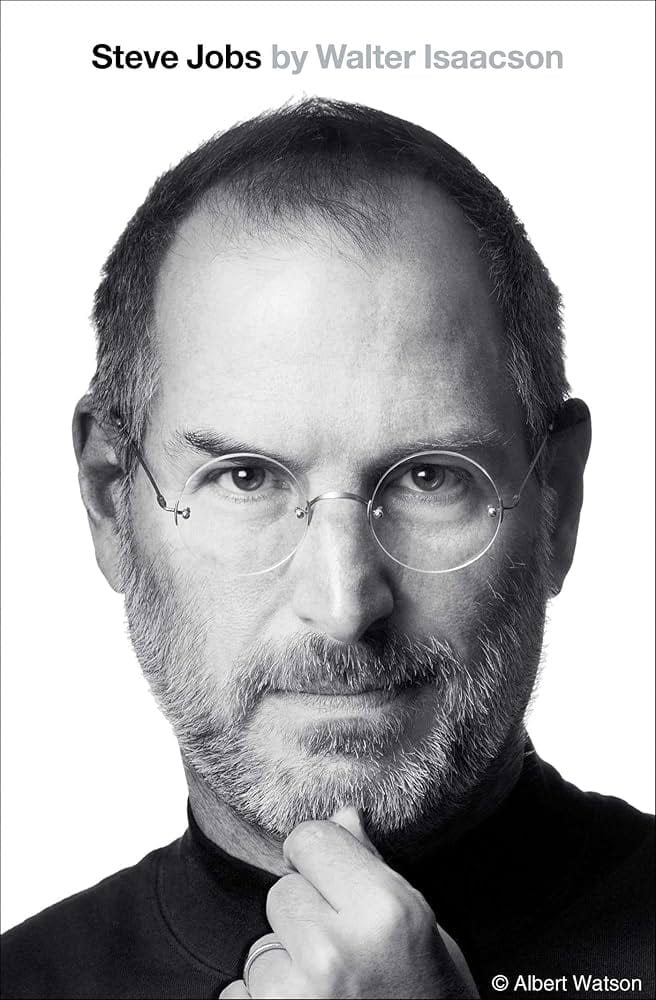- Non Fiction Fix
- Posts
- Steve Jobs
Steve Jobs
by Walter Isaacson
Overview
"Steve Jobs" by Walter Isaacson, published in 2011, is an authorised biography of the co-founder of Apple Inc., Steve Jobs. Based on more than 40 interviews with Jobs over two years, as well as interviews with over 100 family members, friends, adversaries, and colleagues, the book provides an in-depth look at Jobs' life, personality, and the innovations he brought to the tech industry.
Central Thesis
The central thesis of the biography is that Steve Jobs' unique blend of creativity, passion for perfection, and intense drive revolutionised multiple industries, including personal computing, animated films, music, phones, tablet computing, and digital publishing. Isaacson explores how Jobs' personal and professional experiences shaped his approach to innovation and leadership.
Key Strengths
Comprehensive Research: The biography is based on extensive interviews and thorough research, providing a well-rounded view of Jobs' life.
Insightful Analysis: Isaacson delves into Jobs' personality traits, including his perfectionism, charisma, and sometimes abrasive nature, offering a nuanced portrait.
Engaging Narrative: The book reads like a compelling story, filled with anecdotes and insights that keep readers engaged.
Candid Perspectives: Jobs encouraged honesty from those interviewed, resulting in a balanced portrayal that includes both his successes and flaws.
Structure of the Book
The book is structured chronologically, detailing Jobs' life from his early years and the founding of Apple to his later successes with Pixar and the iPhone. Key themes are woven throughout, including innovation, leadership, and the intersection of technology and creativity.
Key Concepts and Practical Insights
Innovation and Design: Jobs' belief in the importance of design and user experience in technology. Focus on creating products that are not only functional but also aesthetically pleasing.
Leadership Style: Jobs' intense and sometimes controversial management style. Understand that strong leadership can involve both inspiration and confrontation.
The Power of Passion: Jobs' relentless pursuit of his vision and passion for his work. Pursue your passions with dedication and commitment, even in the face of adversity.
Learning from Failure: Jobs' experiences with failure and how they shaped his later successes. Embrace setbacks as learning opportunities to drive future innovation.
Memorable Quotes
"Innovation distinguishes between a leader and a follower."
"Your work is going to fill a large part of your life, and the only way to be truly satisfied is to do what you believe is great work."
"Stay hungry, stay foolish."
Critique
While "Steve Jobs" is widely praised for its depth and engaging storytelling, some critics argue that it may romanticise Jobs' personality and overlook the impact of his management style on employees. Additionally, the book's length may be daunting for some readers.
Target Audience
"Steve Jobs" is valuable for entrepreneurs, business leaders, tech enthusiasts, and anyone interested in the intersection of creativity and technology. Its insights into innovation and leadership make it suitable for a broad audience.
Conclusion
"Steve Jobs" by Walter Isaacson offers a comprehensive and engaging portrait of one of the most influential figures in modern technology. Through detailed research and candid interviews, Isaacson captures the complexities of Jobs' personality and the innovations he championed. The biography serves as both an inspiring story and a cautionary tale about the challenges of leadership and creativity, making it a must-read for anyone looking to understand the mind behind Apple and its revolutionary products.
